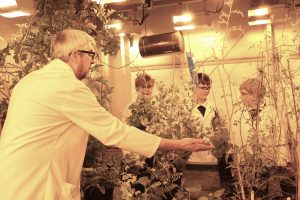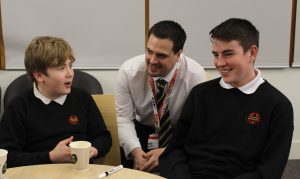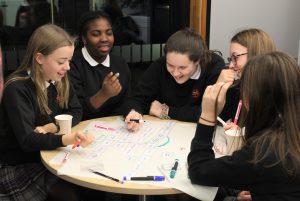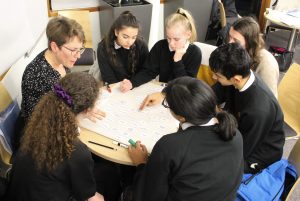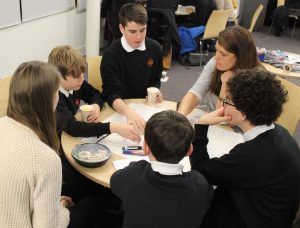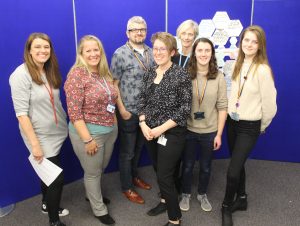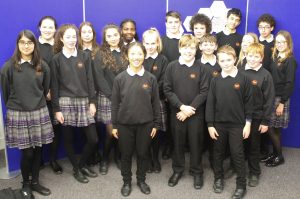In the week when we heard that Southampton was one of the four cities shortlisted in the City of Culture 2025 competition, it felt like a good opportunity to share more about our Climate Change Theatre project. We feel very excited about our involvement with this project and the way it showcases how we can use science and art to inspire young people and how the arts can be used as a powerful vehicle to engage people with the global issues facing us all, spread understanding and reach new audiences.
Telling the story of climate change is a challenge being undertaken by a group of young people who are bringing together science and art in a unique project.
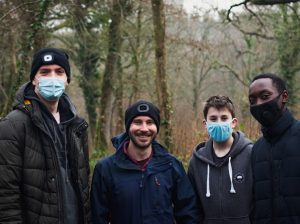
With Southampton and surrounding areas being both the inspiration and backdrop for the piece, our climate change youth group have been spending time in 3 different environments; the forest, the beach and the city finding out more about the impact of climate change on these areas and the opportunities for individuals to take action.
The Forest
Only 15 minutes on the train from Southampton, the New Forest is a world away from the hustle bustle of modern life. Working in partnership with the New Forest National Park Authority, we visited 3 different locations; the ancient woodlands in Beaulieu Estate with the Countryside Education Trust, Brockenhurst and a cycling experience at Ashurst with PEDALL cycling. As we explored each thriving green corner, our guides shared how the Countryside Education Trust was tackling climate change through nature recovery – restoring natural habitats to enable wildlife to thrive, both within and around the national park. These three sessions had a hugely positive impact on our young people, particularly those with long term health needs.
Our of our parents said:
‘He took two big lungfuls of New Forest air and wondered what he was being anxious about.’
The group were keen to know how we can play our part in small ways to help reduce the impact of our lives on the environment around us and were given the example of reducing car journeys. During lockdown more deer were seen around villages in the New Forest due to fewer cars being on the roads.
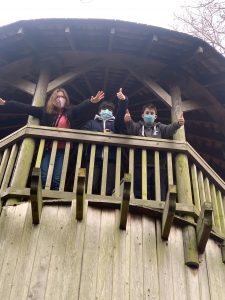
>>> Watch a short film about our time in the New Forest here<<<
The beach
The group then continued their explorations on Weston Shore with marine biologist, Holly Jenkins. Holly got our young people to take part in scientific demonstrations, litter picking, and talked to them about how we can mitigate threats to our local coastlines such as global warming, acidification, overfishing and plastic pollution, as part of British Science Week, the young people produced video campaigns under the heading ‘The Oceans are rising and so are we’
Find out more on the SOTSEF website here.
The city
Our third and final environment was focused on an urban environment. Working with the Southampton National Park City Project, our group has been looking at air pollution and sustainable farming and appreciating the green areas we have on our doorsteps without even realizing. The morning spent at City Farm Southampton was a moment of calm, only a couple of minutes away from the busy and bustling city.
To round off the discovery part of this project, our young people will be exploring the role of government in setting policy to support climate change action. From the local government perspective, Cllr Chris Hammond will be talking to our group about the challenges facing cities, in particular for Southampton, air pollution and we will also be taking our young people to meet with Steve Brine MP and Alok Sharma MP and COP26 President to hear about the opportunities and challenges from a National and International perspective.
Then, the exciting work begins, inspired by what they have discovered over the past few months, our youth group will devise, storyboard, produce and perform a piece of theatre which will tell the stories of climate change in these different environments.
These will be performed over the Jubilee Bank Holiday weekend in Southampton (Palmerston Park) on 2 June and in the New Forest (Countryside Education Trust, Beaulieu) on 4 June – look out for details of the free performances in the coming weeks.
Find out more about the project here:
http://www.theatreforlife.co.uk/climate-change
CLIMATE CHANGE PROJECT : Theatre For Life
Follow us on social media:
@LifelabSoton
@theatre_life2
